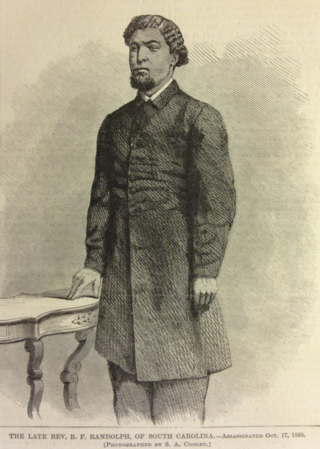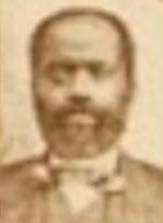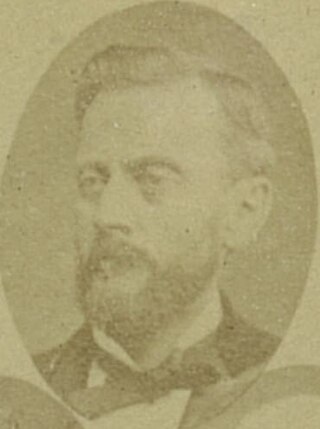Related Research Articles

Benjamin Franklin Randolph was an American educator, spiritual advisor, newspaper editor who served as a South Carolina state senator during the Reconstruction Era. Randolph was selected to be one of the first African American Electors in the United States at the 1868 Republican National Convention for the Ulysses Grant Republican presidential ticket. Randolph also served as the chair of the state Republican Party Central Committee. He was a delegate to the 1868 South Carolina Constitutional Convention, where he played an important role in establishing the first universal public education system in the state, and in granting for the first time the right to vote to black men and non-property owning European-American men. On October 16, 1868, Randolph was assassinated by members of the Ku Klux Klan.
Monday Floyd was a carpenter and Republican State Representative, who was elected to two terms in the Georgia House of Representatives during the Reconstruction Era. As one of several emancipated African Americans who were elected to public office, Floyd faced considerable resistance. He received a threatening note from the Ku Klux Klan promising that there would be no more "Negro" legislators in Georgia, and requesting him to leave town.
Joseph Adkins was a minister and state senator in Georgia during the Reconstruction Era after the American Civil War. He was a Republican who represented Warren County, Georgia. He supported civil rights for African Americans and reported racially motivated violence by the Ku Klux Klan. He was murdered in May 1869, after having led a delegation to Washington, D.C. to obtain military protection against widespread acts of violence by the Klan.
Josiah Sherman was a Georgia state senator during the Reconstruction era. He was from Vermont. He sat in the 80th Georgia General Assembly from 1869 to 1870. Emma Spaulding Bryant boarded with Sherman and his wife on the outskirts of Atlanta.
Joseph Crews was a Reconstruction militia leader who served as a member of the South Carolina House of Representatives from 1874 until his assassination in 1875. He was the state's highest-ranking military official in the 1870s and was put in charge of the state militia whose main purpose was to protect African-American voters. African-Americans were 58.9% of the population of South Carolina in 1870. He was reportedly murdered by Democrats in the run-up to the 1876 South Carolina gubernatorial election.

William Beverly Nash was a barber, shoe shine, porter, waiter, and state senator in South Carolina. An African American, Nash was born enslaved in Virginia, Nash gained his freedom at the age of 43 with the passage of the 13th Amendment. After the American Civil War, he became a state legislator during the Reconstruction Era. He was instrumental in drafting South Carolina's Constitution of 1868, and held several committee positions in the state government over his career. He held his office for 21 years before resigning.
Simeon Farr was an American politician who was elected as a state representative in 1868 in South Carolina during the Reconstruction era. He represented Union County, South Carolina. His photograph was used in a composite of Radical Republican officials from South Carolina. His name is spelled Simon Farr in an 1868 House document.

Junius S. Mobley, also known as June Mobley, was a politician in South Carolina. He was considered an ultra-radical, and was one of South Carolina's 1868 Radical Republican members of the Legislature. He reportedly became a preacher after the Reconstruction era. Mobley was a political leader during the Reconstruction era in South Carolina and was involved in the distribution of ammunition to freedmen. He was part of the Union Brotherhood that replaced the Union League in 1872. Mobley was from Union County, South Carolina. John Schreiner Reynolds wrote about Mobley and other African American legislators in 1905. He was not a fan of Mobley's, and described him as "mulatto" and said he gave incendiary speeches causing bloodshed for the "men of his own race". He also referred to Mobley as a "vicious and mouthy Negro".

Powell Smythe was a member of the South Carolina General Assembly during the Reconstruction era. He represented Clarendon County, South Carolina.

Sancho Saunders was a member of South Carolina's House of Representatives during the Reconstruction era. He represented Chester County, South Carolina. He was documented as a literate Baptist minister who was a slave before the American Civil War. He was African American. His photograph was included in a montage of Radical Republican South Carolina legislators.
Henry W. Webb was a political leader in Reconstruction era South Carolina. He was a delegate to the South Carolina Constitutional Convention of 1868 and elected to the South Carolina House of Representatives the same year.

John Hannibal White was a delegate to South Carolina's 1868 Constitutional Convention, a two-term member of the South Carolina House of Representatives, and a state senator in South Carolina. He worked as a blacksmith.
Henry L. Shrewsbury was an American teacher and Reconstruction era state legislator in South Carolina. He was described as a free mullato, and represented Chesterfield County in the South Carolina House of Representatives from 1868 until 1870.

David Timothy Corbin was a Reconstruction era lawyer, officer in the Union Army, prisoner of war, U.S. Attorney, state senator, U.S. Senator-elect, and judge in South Carolina. He was from Vermont and came south with the Freedmen's Bureau to Charleston, South Carolina.
William U. Saunders was a barber, soldier, politician, and lawyer who represented Gadsden County, Florida, in the Florida Legislature during the Reconstruction era.
Henry St. Clair was an American politician. He represented Macon County, Alabama in 1872. He lived in Tuskegee. He testified about the political climate, canvassing, and acts of intimidation against African Americans who overwhelmingly supported the Republican Party.
The House Select Committee on Reconstruction was a select committee which existed the United States House of Representatives during the 40th and 41st Congresses with a focus related to the Reconstruction Acts. The 39th Congress had had a similar joint committee called the United States Congressional Joint Committee on Reconstruction.
Allen Pardee Huggins (1839–1916) was a Union Army soldier, Freedmen’s Bureau official, sheriff, county school superintendent, tax official, and state legislator in Mississippi.

Reuben Oscar Reynolds was a lawyer and state senator in Mississippi. He represented Monroe County and Chickasaw County in the Mississippi Senate for several terms during and after the Reconstruction era ended.
Granville Bennett was an American farmer and state legislator in Alabama. He represented Sumter County, Alabama in the Alabama House of Representatives during the 1872 and 1874 terms. He and other black members of the state legislature who served during and in the years that followed the Reconstruction era are included on a historical marker. A Republican, he signed onto a "Memorial" addressed to U. S. President Ulysses S. Grant.
References
- ↑ Carolina, South (July 11, 1868). "The Constitution of South Carolina, Adopted April 16, 1868: And the Acts and Joint Resolutions of the General Assembly Passed at the Special Session of 1868, Together with the Military Orders Therein Re-enacted". John W. Denny – via Google Books.
- ↑ Congress, United States (July 11, 1868). "The Congressional Globe". Blair & Rives – via Google Books.
- ↑ "Radical Members of the South Carolina Legislature". Smithsonian Music.
- ↑ States, United States Joint Select Committee to Inquire into the Condition of Affairs in the Late Insurrectionary (July 11, 1872). "Report of the Joint Select Committee to Inquire Into the Condition of Affairs in the Late Insurrectionary States". U.S. Government Printing Office – via Google Books.
- ↑ Taylor, Alrutheus Ambush (July 11, 1924). The Negro in South Carolina During the Reconstruction. Association for the Study of Negro Life and History. ISBN 9781404760899 – via Google Books.